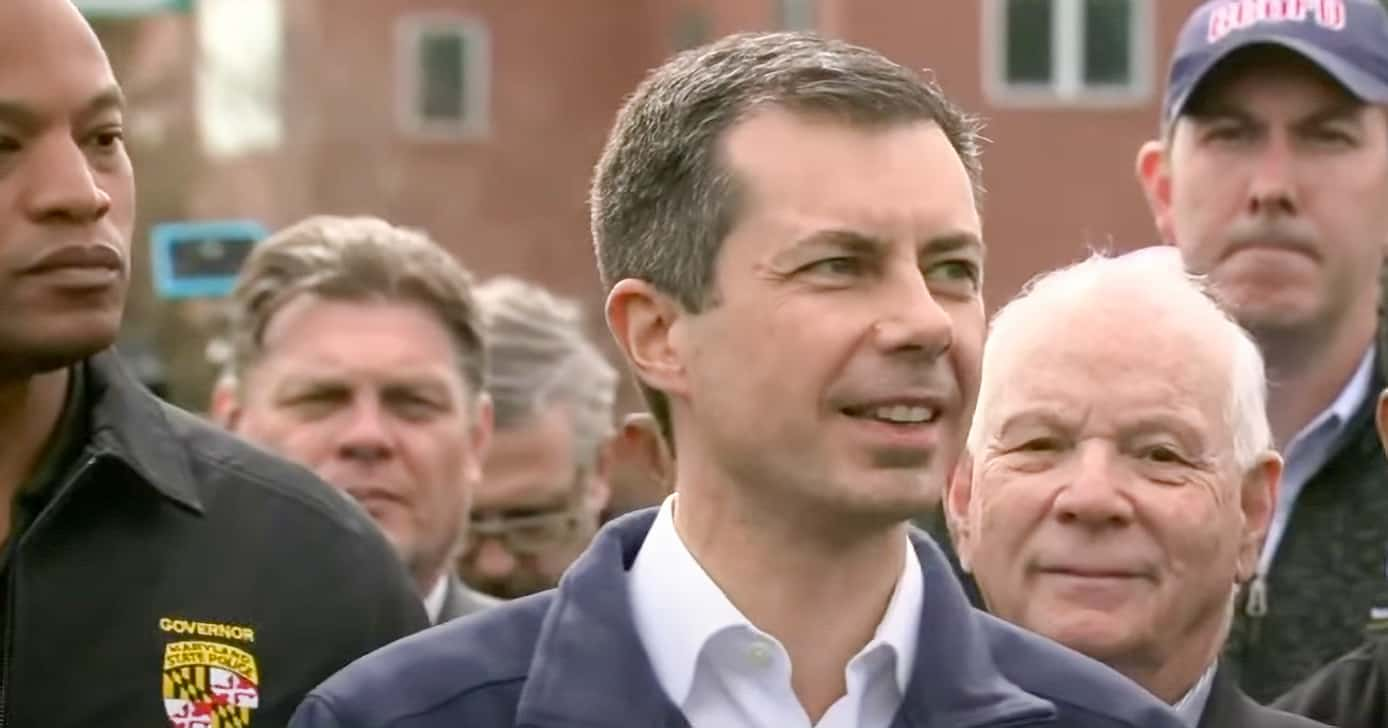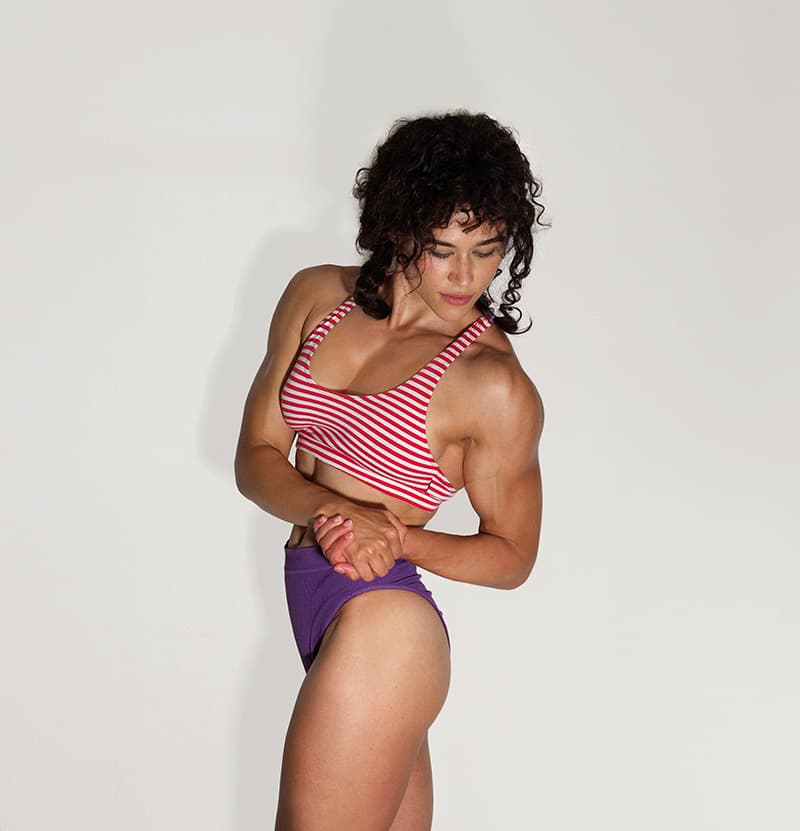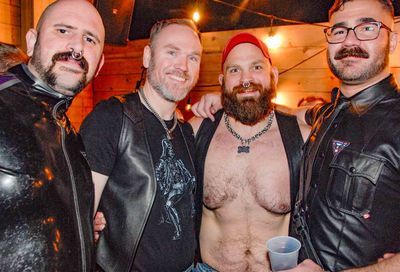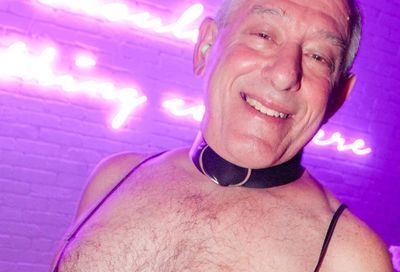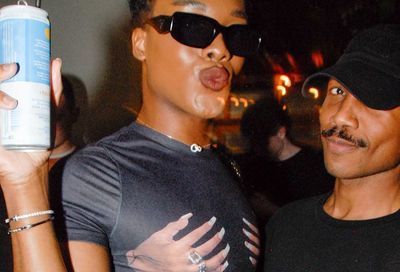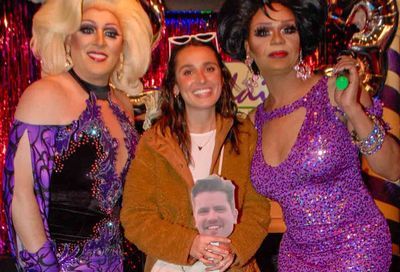The Queen of Comedy: An interview with Mo’Nique
Whether performing stand-up or pulling out the dramatic stops, Mo'Nique aims to be true to herself

Five years ago, Mo’Nique gave a moving, gracious, and heartfelt toast to a sold-out crowd at the HRC National Dinner.
“I want to thank y’all for accepting me into a community that oftentimes struggles to be accepted by the world,” she said. Mo’Nique was there to present the Visibility Award to Lee Daniels, who, the year prior, had directed her in the movie Precious. She won an Oscar for her supporting role as Mary, the angrily brutal mother of the titular character. This year, Mo’Nique was nominated for an Emmy for portraying the bisexual “Mother of the Blues” Ma Rainey in the HBO film Bessie. While she didn’t win, the film took four statues, including Outstanding Television Movie.
Most people got to know Mo’Nique years earlier as a comedian. Or as a host of the syndicated variety show Showtime at the Apollo. Or as the star of the UPN sitcom The Parkers. Or as one of the featured stand-up stars of the documentary The Queens of Comedy — the one who got a lot of attention from her frank admission about anal sex. “That is some painful, horrible shit, to fuck in the butt,” she says in the film, recorded live on stage in Memphis, adding, after a pause, “But I like it now.”
Of course, plenty of people in our area knew the 47-year-old woman born Mo’Nique Imes decades before all that. A graduate of Maryland’s Milford Mill High School and Morgan State University, Mo’Nique got her start cracking jokes at a Baltimore comedy club over 20 years ago. Her roots in the local gay community go back even further. When she was only an impressionable teenager, a group of gay friends came out to her and took her to her very first gay club in D.C. It proved to be a formative experience in helping Mo’Nique become the type of woman and performer she is — one who endeavors to be open and honest and true to herself, and to help others in the same pursuit.
Mo’Nique, who brings her current stand-up act to D.A.R. Constitution Hall on Sunday, Oct. 4, jokes she was born an actor — “Y’all just didn’t know about me yet” — and she’s certainly a natural on stage. A few years ago, she fulfilled what has always been her lifelong dream, hosting BET’s The Mo’Nique Show, which ran two seasons. She hopes for more work as a talk show host, and wants to continue down her successful acting path as well. But comedy will always remain her priority.
“I’ve never stopped touring since the first time I said I was going to do comedy for a livelihood,” she says. For Mo’Nique — and her fans — comedy is the best therapy.
METRO WEEKLY: What can we expect from your upcoming show at D.A.R. Constitution Hall?
MO’NIQUE: I always tell people, if you want to get to know me, come to a show. The stage has always been very therapeutic for me. It’s allowed me to tell my truth and laugh with the audience along with what I’m saying.
And for me, Constitution Hall is like home, because I’m from Baltimore, Maryland. So whenever I do Constitution Hall, it feels like it’s a big family reunion.
MW: How is comedy therapeutic for you?
MO’NIQUE: It’s very therapeutic because it allows you to say what’s on your mind out loud. And to know that you’re not unique in your thinking. It lets me know that what I think is funny, a whole lot of people think is funny, too.

MW: And you’re not afraid to push the envelope.
MO’NIQUE: I think that’s what people want, it’s just the honesty. That’s why, when people say, “You pushed the envelope,” or “You’re unafraid to say what’s real,” it makes me say, “Well, why ever would you be afraid to say what’s honest and real?” So I don’t think I push the envelope. I think that I just say what’s honest and what’s real — to me.
MW: Some gay people first got to really know you from your Queens of Comedy stand-up. In it, you specifically mention anal sex.
MO’NIQUE: [Laughs.] Talking about the anal sex? Yes indeed, I love it!
MW: It’s something people don’t expect a comedian to say but can totally relate to.
MO’NIQUE: Right, but you can totally relate to that. Because every woman in the world knows her first experience was exactly what I said! You can’t relax yourself enough to be prepared for that. [Laughs.]
I’m not going to go to fantasy, this is the reality. And I’m going to be honest. When you say it’s unexpected, I understand why. Because we’ve gotten comfortable in fantasy, and we’ve gotten comfortable in being dishonest.
For me, honesty is very therapeutic. It’s just a freedom that I’m unwavering about. I’m not going to give up that freedom, that’s mine to have.
MW: When did you realize that that’s a core part of you — being honest and open about yourself?
MO’NIQUE: When I started doing comedy, I was always very honest, but I wasn’t really letting you into me. And one night my husband said, “Momma, you are funny. But the moment you free yourself, and you really walk on that stage in freedom, watch what’s going to happen.” So I’ll say within the last 10 years.
MW: I guess I was expecting you to say since you were a teenager or something.
MO’NIQUE: No, because that wouldn’t be honest, that wouldn’t be the truth! It’s like, you have to evolve, and come to those places and spaces where you say, you know what? It’s okay. It wasn’t that I was ever dishonest, but I would only let you in so much.
MW: Can you elaborate on your long standing history with the gay community and how it is you became such an ally?
MO’NIQUE: Well, you know, the gay community has long been an ally to Mo’Nique. Before anybody knew who Mo’Nique was, there was a group of young, beautiful black men who embraced me in a way that I had never been embraced before. And they took me into this beautiful world. And I can remember, when I was like 17, going to the ClubHouse on Upshur Drive in Washington, D.C. And this was before I knew that they were gay. I just thought I was the special girl and they wanted to hang out with me, all these good-looking boys.
So I’m thinking, okay baby, I’m the special one! So as we’re going over to the club, I see they’re all giggling. And I’m thinking, okay, what’s the joke? Well, when we get into the club, that was the night they said, “This is who we are.” And everybody in that club was having such a great, beautiful time, and it was these beautiful men everywhere. Very few women. It made me fall in love with that community, because I had never experienced anything like that — where you go and everybody is having a great time.
But then I had never experienced the stories that I got later. All of those beautiful young men had the same story — “My family doesn’t accept me.” Some of them had to live with somebody else because they were put out. The stories that they had and the way they embraced me, it just made me love them. And I didn’t look at them as, oh my goodness, they’re gay! Or oh my goodness, she’s a lesbian! It was, oh my goodness, these are beautiful people! With no label, no title — they were just beautiful people. As y’all still are. Just beautiful people. I don’t care if you say, “Mo’Nique, I’m in love with another man.” Listen: If you and that man love each other, which makes y’all better human beings for the better of humanity, goddammit love him! Love him, baby! Do it!
When a friend, who had been married twice, who has children, came up and said to me, “Mo’Nique, I am gay,” I said to her, “It’s about damn time you said it!” I absolutely love people who are unafraid to be who they were made to be.
MW: A lot of people struggle with it because of religion and culture. But it sounds like you didn’t necessarily have that.
MO’NIQUE: Well no, I didn’t have that, but I witnessed it. People struggle with conditioning and tradition. They struggle with other people’s opinion. I had an uncle Donald. I watched my family mistreat him. And as a child, I really couldn’t understand it. You just don’t know why they always got smart with Donald, or there was just an imbalance. Well when I got older, and I understood what it was, it made me look at my grandmother and say, however could you mistreat your child? You birthed that child. However could you mistreat him because he’s your brother or your sister, because that’s your own. So that was something that I said I never wanted to put someone through. So I’ve experienced it firsthand.
I have an uncle Tina. You heard the name — uncle Tina. And my sweet grandmother she struggled with the fact that her daughter was a lesbian. And though she loved her, she struggled with it because the people in her church said it was wrong. And I remember one day she called me up and said, “I’ve struggled with this shit for so long, only to come find out that the woman [at church] who was really bothering me, her daughter’s gay!” I said, “Welcome to the world! Welcome to the world. I promise you she didn’t wake up that way!”
It was just like, welcome to the world — the one thing you were so caught up and worried about, is the very thing that that is. So you lived half of your daughter’s life unaccepting of her because you were worried about this woman’s opinion, only to find out her daughter is gay too.
MW: Human nature is fascinating, isn’t it?
MO’NIQUE: Come on now! If we start watching Discovery Channel, we’ll get along better. If you watch these beasts and these animals, it’d be a better place.

MW: You touch on some of the struggles of coming out in Blackbird, Patrik-Ian Polk’s independent film in which you play the mother of a budding gay Southern Baptist. How did that role come along?
MO’NIQUE: We got a call from Isaiah Washington, who I think is one of the most brilliant actors of our time. He said to my husband Sidney, “I think I have something here that you and your wife would like to look at.” So he sent us that script. And by time I got finished reading page one, I looked at Sidney and I said, “Daddy, if they put on screen what’s on this paper, this is going to change hearts and minds.” And that’s how we got involved.
MW: That’s a motivating factor for you in your work — changing hearts and minds and helping people.
MO’NIQUE: Yeah, because so many of the stories go untold. And you continue to see people in so much pain, and just hurting. So if one person can get healed, then we’ve done what we set out to do. So yeah we — I say we because it’s my husband and I — we pretty much like doing things that, may it be funny, may it not, may it be whatever, but you walk away saying, I didn’t think about it like that.

MW: Was playing the abusive mother in Precious a hard role for you to take on?
MO’NIQUE: No! Mary Jones was so much fun. Oh my god, baby! Every time Mr. Daniels said action, it was this little girl inside of me saying, “You can do it, you can do it.” Because it was me playing this character, playing dress up. And it was me saying to Mr. D, “You trust me to do this?” We actually had a great time on that set. In between takes we were listening to house music, we may have a cocktail, had us some crab legs. It was just a great time.
MW: Most recently you appeared as the bisexual blues singer Ma Rainey in Bessie, which just won four Emmy Awards, including Outstanding Television Movie. What do you take away from your work in that film?
MO’NIQUE: It was absolutely breathtaking, because Queen Latifah just embodied Bessie Smith. And to watch that happen, it was just like, go ahead sister. To meet these dynamic women — I heard very little about Bessie Smith because she’s really not in any history books in school. I knew nothing of Ma Rainey. I knew nothing of these people. And to be introduced to these dynamic people was an honor. And I’m appreciative that that woman, Ma Rainey, allowed me to bring her to life.
MW: Was knowing nothing about Ma Rainey especially the inspiration for taking on the role in the first place?
MO’NIQUE: Well, when I initially got the script, they wanted me to play Viola, the sister. I was grateful that they considered me for that, but I told them, “No thank you.” I said, “However, I read Ma Rainey, and I would like to play her.” And they said, “Well then, you shall be Ma Rainey.” And what made me take that role — that woman was so honest, and so giving, and so real. And she was unwavering and unapologetic about who she was. So she just spoke to me as I read that script. And Dee Rees, who wrote that script, it was as if she knew those people. So Ma Rainey just gravitated to my spirit. We just connected in all those pages.
MW: It’s surprising that they wanted you as Viola, because you just seem such a natural in your role as Ma Rainey.
MO’NIQUE: I guess they said, well damn if she can be Mary Jones, she can be Viola. But Khandi Alexander as Viola, wooo! Did you see that performance? She was absolutely brilliant, just brilliant. Everyone in that movie was just brilliant. So to be a part of that, and to be able to play with my sister that I’ve watched since I was a little girl. To play with that icon, and that living legend.

MW: And you got to do a little dance with Queen Latifah, too. Did you actually sing as Rainey in all the scenes on stage?
MO’NIQUE: They had to get a voice-over person for me, but dammit I tried to give it my everything. And in my mind, baby, I was giving it everything. [Laughs.]
MW: And you got an Emmy nomination for the work, so obviously others thought you were giving it everything too.
MO’NIQUE: No, Ma Rainey got that Emmy nomination. I can’t take that from her.
MW: The role also fits your m.o. of trying to shine a light on untold stories and people — in this case, an unsung hero.
MO’NIQUE: Well, you know, oftentimes when they say history, we break that down to say his-story — [but] there are so many amazing people that are not in his-story. But when we say our story, then you start finding out about these amazing people. So, I do feel an obligation to introduce those people because they were never introduced to me.
Most of the black women we see, who were entertainers, died broke, died alone, died with no family. Ma Rainey, that woman died wealthy. That woman died with love. But that story is not in any of our books. So it’s an honor to be able to tell that story. Because the same things that those women were struggling with then are the same things we’re struggling with now. I’m appreciative to play that role because what it lets me know is, you’re not thinking the wrong way. You’re not doing this the wrong way. It’s okay to say no when it doesn’t make sense. It’s okay to stand in truth. And not bow down. It’s okay for those things to take place. Those stories we don’t oftentimes see. So me, playing Ma Rainey, it did so much more for me than just playing Ma Rainey — it let me see down the road. It allowed me to say, you better love your family with everything you have, you better know how to put your priorities in order, because it doesn’t always have to be the ending we’ve been shown.
MW: And also the women that we’ve seen through history don’t necessarily look like Ma Rainey, either.
MO’NIQUE: Right. The women that you have seen in history, and what they show us in the books, you’re right. Because when I say to you, Doug, do you know who Madam C.J. Walker was? Madam C.J. Walker was the first self-made woman in this country. And you know how she made her millions? Off of black hair care products. But that’s not in our history books. We have to dig for that information. Now when you have the first black woman who was a self-made millionaire — Oprah Winfrey wasn’t the first. That’s not in our books, but that’s something that we should know. When I say, do you know who the Peters sisters were? The Peters sisters were before the Williams sisters, Serena and Venus. They were these two black women that were just beating everybody’s ass in tennis [in the mid-1900s]. But because they were black they could only go so far. What we know now is the Williams sisters, but there’s never been a mention of the Peters sisters.
So once we take history and make it our story and not his-story, we then can stop actually labeling, having separate communities, having separate conversations. Because, see, I don’t believe that there’s a gay community, or a black community, or a white community — we’re just a community of human beings. And once we start treating each other that way, watch what’s going to happen. So Oct. 4, I want every gay baby in Washington, D.C., at Constitution Hall. Because the conversation we’re going to have that night? Ooo-ooo! [Laughs.]
MW: Just to be clear, are you planning to portray Madam Walker or the Peters sisters on screen down the line?
MO’NIQUE: No, not at all. No plans to. It’s just so unfortunate that when I put those names out there, you don’t know them. And that’s not to judge it — because there are black folks that don’t know them. Because it’s just not a part of our history. And the point I was making — with Ma Rainey, had I not read that script, I still to this day would not know who that woman is. Because it’s just not mentioned. So to be able to bring that character to life was such an honor because what it did was gave me a history lesson of our story.
MW: And that gets to something that Ma Rainey says in the movie, about the blues not being about you, the performer, but about knowing and connecting with the people, the audience. And if I’m hearing you right, that’s sort of what you aim for as well.
MO’NIQUE: You know how they say that, when you die, the spirit goes on? I think I’ve been here a lot of times! [Laughs.] And I think Ma Rainey said, “Alright, it’s my time to tell the story now!”
MW: I would be remiss if I didn’t ask if there’s any chance for another Queens of Comedy. I know you had a reunion of that on your talk show.
MO’NIQUE: Working with those — I can’t call it working — playing with those three women was such an honor. Because they are three of the most talented female comedians I’ve ever had the pleasure of playing on the stage with. We all made a pact, during the Queens of Comedy, that we would never do it again if all of us couldn’t do it. And we’ve kept that promise to each other. We haven’t been able to connect. So for Adele Givens, Sommore and Laura Hayes, that moment in time was such an amazing moment and I’m forever grateful to those three women.
MW: So for your future, you hope for another talk show? What else?
MO’NIQUE: Yes, yes. There will be another show. Now I can’t tell you when, can’t tell you where, but what I can tell you is, it will be.
I hope for my future that I can be the best wife that I can, the best mommy I can be, the best friend I can be. And to wrap it all up, I hope in my future, I can become a better human being.
Mo’Nique appears Sunday, Oct. 4, at 7 p.m. D.A.R. Constitution Hall, 1776 D St. NW. Tickets are $55 to $104. Call 202-628-1776 or visit dar.org/conthall.
Support Metro Weekly’s Journalism
These are challenging times for news organizations. And yet it’s crucial we stay active and provide vital resources and information to both our local readers and the world. So won’t you please take a moment and consider supporting Metro Weekly with a membership? For as little as $5 a month, you can help ensure Metro Weekly magazine and MetroWeekly.com remain free, viable resources as we provide the best, most diverse, culturally-resonant LGBTQ coverage in both the D.C. region and around the world. Memberships come with exclusive perks and discounts, your own personal digital delivery of each week’s magazine (and an archive), access to our Member's Lounge when it launches this fall, and exclusive members-only items like Metro Weekly Membership Mugs and Tote Bags! Check out all our membership levels here and please join us today!




